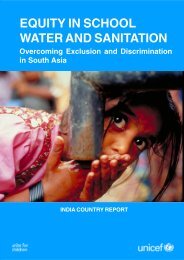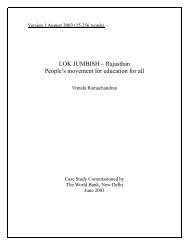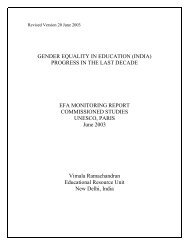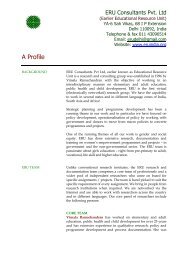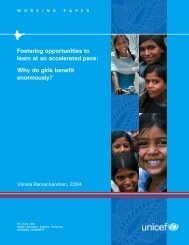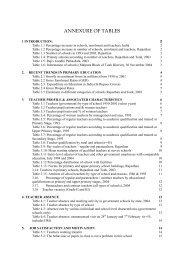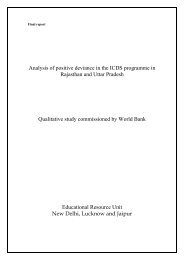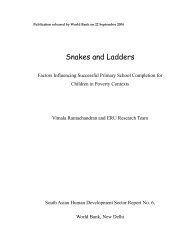primary school teachers the twists and turns of everyday practice
primary school teachers the twists and turns of everyday practice
primary school teachers the twists and turns of everyday practice
Create successful ePaper yourself
Turn your PDF publications into a flip-book with our unique Google optimized e-Paper software.
Version 20 Oct 08, edited final<br />
administrative head. At <strong>the</strong> end <strong>of</strong> <strong>the</strong> exercise <strong>the</strong> number <strong>of</strong> <strong>teachers</strong> trained is<br />
compiled <strong>and</strong> <strong>the</strong> expenditure statement prepared.<br />
Even when promising new approaches are introduced (like Nali Kali or ABL, ILIP or<br />
Teacher Empowerment), <strong>the</strong> initial promise soon dissipates as <strong>the</strong> programme<br />
follows a predictable trajectory:<br />
⇒<br />
⇒<br />
⇒<br />
⇒<br />
⇒<br />
⇒<br />
⇒<br />
Someone at <strong>the</strong> national or state level becomes convinced <strong>of</strong> a new approach<br />
that could change <strong>the</strong> <strong>school</strong> from being dysfunctional to a vibrant learning<br />
institution. Sometimes <strong>the</strong> idea is shared by a larger group <strong>of</strong> peer leaders who<br />
jointly own <strong>the</strong> idea.<br />
This idea is <strong>the</strong>n tried out on a modest scale. A lot <strong>of</strong> effort goes into nurturing<br />
<strong>the</strong> pilot—national, state, district <strong>and</strong> <strong>school</strong> level people work toge<strong>the</strong>r as a<br />
team. Practitioners outside <strong>the</strong> system are invited to participate (sometimes<br />
even partner). Organisations like RIVER <strong>of</strong> Madanapalle, Homi Bhabha<br />
Centre, S<strong>and</strong>han or Bodh join in <strong>and</strong> work with people in government.<br />
Papers are written <strong>and</strong> presentations made, <strong>and</strong> if <strong>the</strong> ‘innovation’ is deemed<br />
exciting, best <strong>practice</strong> case studies are commissioned. The new approach is<br />
hailed as a ‘good <strong>practice</strong>’. Some <strong>teachers</strong> bask under <strong>the</strong> nurturing umbrella<br />
<strong>of</strong> <strong>the</strong> new approach—<strong>the</strong>y start engaging with conceptual <strong>and</strong> philosophical<br />
issues.<br />
Then <strong>the</strong> leader decides to scale up—moving from one or two blocks in a<br />
district to cover <strong>the</strong> entire state, from a few hundred <strong>school</strong>s to thous<strong>and</strong>s <strong>of</strong><br />
<strong>school</strong>s. This is where <strong>the</strong> first slip occurs. The painstaking process involved in<br />
nurturing <strong>the</strong> pilot is soon forgotten <strong>and</strong> <strong>the</strong> ‘innovation’ is cast in stone as a<br />
template. Teacher-training is rolled out—in <strong>the</strong> cascade mode—not<br />
significantly different from <strong>the</strong> run <strong>of</strong> <strong>the</strong> mill training that we are so familiar<br />
with, even though <strong>the</strong>re may be differences in methodology <strong>and</strong> <strong>the</strong> material<br />
produced; <strong>the</strong> programme may even be participatory. The roll-out is carefully<br />
monitored—<strong>the</strong> leader <strong>and</strong> his or her trusted lieutenants criss-cross <strong>the</strong> state,<br />
talk to <strong>teachers</strong>, visit <strong>school</strong>s, meet parents <strong>and</strong> so on. A great deal <strong>of</strong> energy is<br />
unleashed.<br />
As a year or may be even two years roll by, cracks begin to appear—<strong>the</strong><br />
scaled-up model is a far cry from <strong>the</strong> pilot. The language <strong>and</strong> vocabulary<br />
sound familiar, but deep down it is not <strong>the</strong> same. What is lost is <strong>teachers</strong>’<br />
ownership <strong>of</strong> <strong>the</strong> process. People speak in hushed tones—‘<strong>the</strong> process was<br />
short-circuited, <strong>teachers</strong> were not taken into confidence, <strong>the</strong> education<br />
establishment is hitting back’.<br />
The leader who initiated <strong>the</strong> new approach is transferred or retires. A new<br />
person arrives, <strong>and</strong> starts <strong>of</strong>f asking questions, <strong>and</strong> ultimately follows <strong>the</strong><br />
bureaucratic dharma: ‘undo what my predecessor did!’<br />
Ongoing projects are not rejected outright; <strong>the</strong>y are allowed to fade away.<br />
Something new appears on <strong>the</strong> horizon: a new visionary with a new idea?<br />
Rajasthan has seen any number <strong>of</strong> ‘innovations’ in education <strong>and</strong> in women <strong>and</strong><br />
rural development. The development l<strong>and</strong>scape <strong>of</strong> <strong>the</strong> state is strewn with examples<br />
<strong>of</strong> innovations that once showed a lot <strong>of</strong> promise but quickly faded away. With each<br />
successive wave in education, especially from 1987 to <strong>the</strong> present, <strong>teachers</strong> got more<br />
cynical. In a group discussion with <strong>teachers</strong> <strong>of</strong> Tonk <strong>and</strong> Jaipur districts (February<br />
2008) it was apparent that <strong>the</strong>y cherish <strong>the</strong> memories, <strong>the</strong>y remember some training<br />
programmes that changed <strong>the</strong> way <strong>the</strong>y look at learning—yet today <strong>the</strong>y are back<br />
into <strong>the</strong> same fold, <strong>the</strong> same predictable routine.<br />
61



